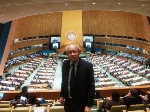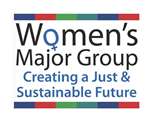Published on Fri, 2015-10-02 10:26
A rare sense of euphoria permeated the adoption of the 2030 Agenda and the Sustainable Development Goals (SDGs) in New York this weekend. The multitude of events that have been taking place on First Avenue and beyond had a party atmosphere. And it was not only government delegates but many civil society activists who negotiated for systemic change that celebrated the new agenda that promises transformative change for sustainable development. Yet will implementation actually bring real change? |
Published on Thu, 2015-10-01 08:58
Security was tight during the Papal address at the Opening Plenary of the UN Summit, so I missed these events as only a few civil society representatives could be accommodated, but certainly this was better than Addis Ababa during the 3rd Financing for Conference. The UN General Assembly formally adopted the Sustainable Development Goals (SDGs) at the opening session without further debate as the document had gone through months of debates ad revisions before Member States agreed on the final text. |
Published on Mon, 2015-09-28 20:12
Last August 2 in New York, the United Nations agreed on the new sustainable development agenda as the guide for their global, regional and national policies over the coming fifteen years. At the core of this new global consensus, seventeen “sustainable development goals” (SDGs) spell out a vision for a better future where poverty everywhere will be eradicated, inequalities within and between countries will be substantially reduced, and current unsustainable consumption and production patterns will be transformed. |
Published on Mon, 2015-09-28 00:00
Last weekend a historic United Nations Summit adopted “Transforming Our World: the 2030 Agenda for Sustainable Development,” thus lifting the curtain on a new agenda for development that will replace the Millennium Development Goals (MDGs) agreed as a global agenda for the 2000 to 2015 period. The Summit convened simultaneously in New York around 170 Heads of State from around the world. This was in addition to the Pope, whose inspirational speech at the UN visibly filled out the vacuum left by today’s lack of statespersons with a global vision. The adopted document contains 17 Sustainable Development Goals (SDGs) with their 169 targets that were agreed in arduous negotiations over a process spanning over more than three years. |
Published on Sat, 2015-09-26 00:00
The Women’s Major Group, bringing together over 600 national and international women’s CSOs, continues to be actively engaged in the 2030 Agenda for Sustainable Development. They want to contribute to the success of the 2030 Agenda, and the implementation of the Sustainable Development Goals in all countries, and help achieve real transformative change towards gender equality, human rights, and responsible and equitable stewardship of the earth’s climate and natural resources. In that sense of a constructive contribution by the women’s organisations. They expressed that although it is good that many different people have become engaged in spreading the word about the 2030 Agenda and the 17 SDGs, the group we call on leadership from the UN to avoid trivialization and over-‐simplification in the main messages to the public. The need to maintain integrity and forward momentum of the SDGs in substance and scope in all messages coming from the UN. |
SUSCRIBE TO OUR NEWSLETTER







